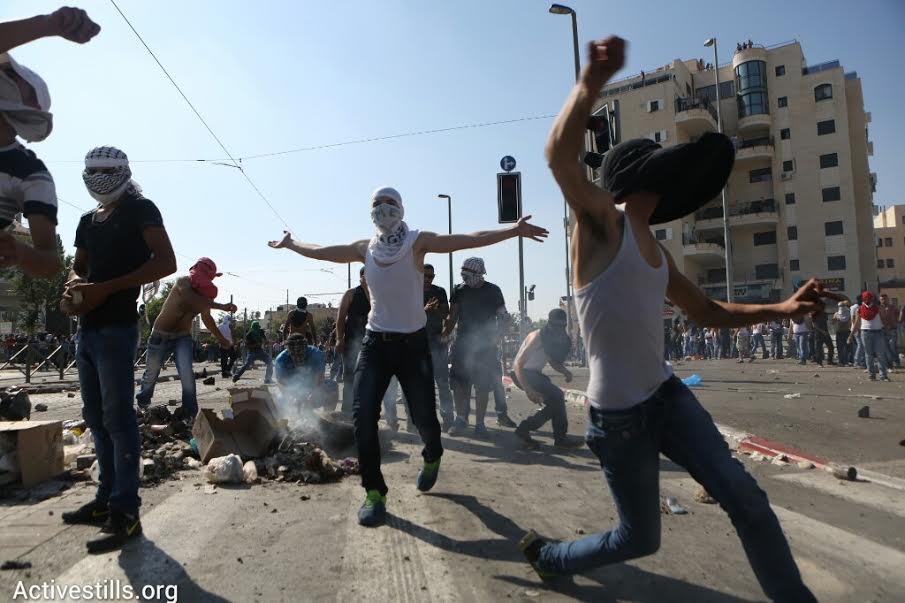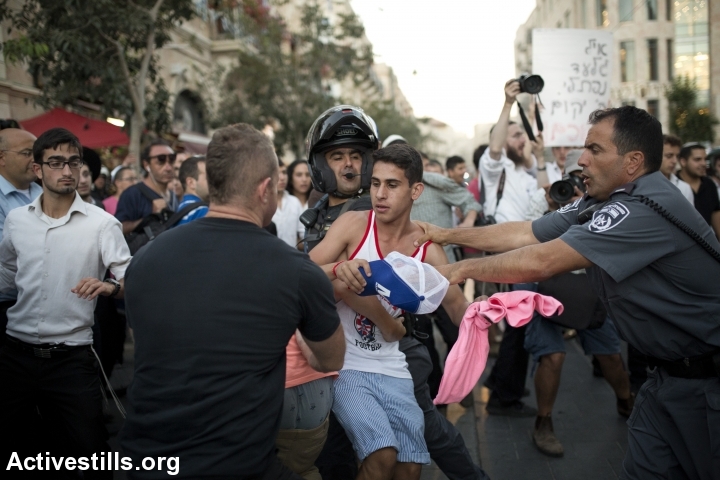Attacks by Jewish hooligans on Arabs, unprecedented incitement by right-wing politicians and clashes between Israeli Police and Arab youth. We’ve been here before, but never like this.
By Ron Gerlitz
This article is written at the height of an extensive, violent escalation in the Jewish-Arab conflict, both within Israel and between Israel and the Palestinians in the territories and the Gaza Strip.
Regarding the events inside Israel, it is important to note the dramatic difference between the events of October 2000 and those of the past week. In October 2000, it was Arab citizens of Israel confronting the police. In contrast, during the past week, Jewish and Arab civilians have faced off and attacked each other. The majority of these incidents involved assault and manifestations of racism by Jewish Israelis against Arab Israelis.

Unfortunately, such attacks are not a new phenomenon, but their scope over the last week is unprecedented. This is not just an escalation – it is an entirely new reality. We have never been in a situation in which attacks against Arab civilians occurred daily and all over Israel. The following is a collection of statements I heard from a firsthand source in the last few days: “Death to Arabs” marches in the streets of Nazareth Illit night after night, gangs of Jewish hooligans roaming the Jerusalem streets and beating Arabs, violent attacks against Arabs on buses, and, in Pardes Hanna, dozens of young people entered a mall screaming “Death to Arabs.” Furthermore, there have been innumerable incidents of profanity against Arabs.
No one comes out unscathed
I didn’t comprehend the scope of this phenomenon from the media, but rather from the fact that every single Arab citizen I have met recently (and I meet many) has told me about an incident that happened to him or to his family. One tells me that someone cursed at his daughter on the bus: “Filthy Arab, get out of here, all of you.” Another one tells me that she went to a clothing store and heard from an Arab worker that all the Arab employees had been fired that day. A friend tells me that his daughter went to the mall where some people (who didn’t realize she was Arab) told her, “All Arabs are dogs.” A colleague who lives near a main thoroughfare in a Jewish town says that a bag of sand was thrown at her house; since then, she has not let her children go out to the yard. Everyone has a story from the last week, and I haven’t yet mentioned the shock waves created by the brutal murder of 16-year-old Muhammad Abu Khdeir.
The result is that Israel’s Arab citizens sense a tremendous fear on a daily basis. Many of them avoid public areas; some have stopped showing up for work at shopping malls or riding public transportation, or they have prohibited their children from doing so. For many Arab citizens, the past week represents a turning point. Fear for their lives and their children’s lives have become a tangible, daily experience. This fear, in turn, gets linked to the insult and anger at the horrendous conditions in which they find themselves. The combination of increasing fear, anger, and sense of indignity is bad news for all residents of this country.

At the same time—and this is also important to point out—there have been attacks by Arabs on Jews: stones thrown at buses on the roads, Molotov cocktails thrown at passing cars, and, in the case that could well become symbolic—checking “who is a Jew” at the entrance to Qalanswa, taking Jewish drivers out of their cars, beating them, and setting their cars on fire. Even though these incidents are much smaller in scope than the attacks against Arabs, they are still a form of violence that is dangerous and morally repugnant. It is only by chance that these events have not yet resulted in casualties, and they have certainly increased the sense of fear and hatred among Jews.
On a personal note: I have worked on the issue of Jewish-Arab relations for a long time. I deal with issues of discrimination and racism, which evoke all kinds of feelings in me, such as anger, exasperation, frustration and a motivation to take action. We now find ourselves in a situation in which Arab citizens are genuinely afraid to walk in the streets, and rightfully so: when they do go out, they may well be verbally abused, or, in the worst case, be physically attacked. This causes me great shame.
And now for the bad news
I usually refrain from drawing pessimistic pictures of the future, but even according to the most cautious approach, it seems that the Jewish-Arab conflict in Israel might have entered a new and dangerous stage. Systematic discrimination by the establishment and popular racism have been some of the fundamental elements of the conflict to date. It seems that another element will now be added: violent conflicts between Jewish and Arab citizens. This is a nightmarish scenario that, unfortunately, no longer seems so imaginary. This is how civil wars in other regions of the world began. All those who value life must do everything in their power to stop this.
Where is the police?
As things stand now, the police have failed utterly to protect Israel’s Arab citizens. It is true that the police have prevented the lynching of Arabs wherever they have been on the scene, but the police do not work systematically to protect Arab lives. Many of the Arabs have been abandoned to the screaming, cursing and beating, and they are lucky that non-racist Jewish Israelis have saved them from the racists.
But it is also worth examining the protests in the Arab towns that included violent attacks on the police and sometimes on Jews as well. The difference between these events and those of October 2000 is clear. The police should now be roundly criticized: for the profusion of arrests, for the consistent and systematically discriminatory treatment of Arab protesters, and the suppression of demonstrations.

At the same time, it should be noted that the violent demonstrations transpired without any shots fired by the police or any casualties. Someone must have given the order to do everything to avoid shooting at the Arab protesters—and the order was carried out. Even though the police endured stones being thrown at them and the roads were closed, they managed to get through all the events without any casualties. In this sense, the police internalized and implemented the lessons of the October 2000 events. This is a positive development in the relationship between the state and its Arab citizens, and an example of how some of the recommendations made by the Or Commission were actually put in place. The police do not deserve a prize, but Noam Sheizaf was apparently right when he said they deserve a good word [Hebrew]. I would add: if only the Border Police and IDF acted this way toward the Palestinians in the occupied territories, many deaths could have been prevented.
There is leadership, and then there is leadership
The local Arab municipal leadership also deserves a good word. In almost all the localities where demonstrations took place, the heads of the local authorities intervened to prevent deterioration into even greater violence. Many of them went into the streets at night to try and prevent an escalation, and there is no doubt that they helped restore calm. At the time of writing, criticism of the heads of these local authorities is being voiced in Arab society. I do not share this criticism. Without their involvement, protestors or police officers may have been killed, and the situation would quickly have escalated from there.
Such an escalation would harm the Arab struggle to attain equality and break Jewish hegemony. At best, it would, strengthen, preserve and reinforce existing patterns of discrimination; at worst, it would contribute significantly to an additional infringement upon the rights of Arab citizens. All this is, of course, in the best-case scenario, in which the escalation does not lead to a civil war or an ongoing bloodbath.
Over the next few days, demonstrations are expected to take place in Arab localities. Both sides—the protesters and the police—will come with much more hatred and anger. One side sees its people subjected to nonstop bombings in Gaza, with more than 100 casualties and counting. The other side has to cope with protesters who, they believe, support the enemy even as their own families take cover in bomb shelters. This is a very dangerous scenario. The next few nights will be a litmus test for both the police and the Arab leadership.
In contrast to the local Arab leadership and the police – who have managed to cool down the flames – is the Israeli government. Not only is the government taking no action to reduce the escalation inside Israel, the past week has seen ministers fomenting provocation against Arab citizens. Foreign Minister Avigdor Liberman and Economy Minister Naftali Bennett have let fly harsh, racist statements directed at Arab citizens. Liberman, as usual, suggested that Arabs should be denied their citizenship.
After a weekend of violence between Arab citizens and the police and between Jews and Arabs, Prime Minister Benjamin Netanyahu himself chose to address Arab citizens. He reminded them that they receive payments from the National Insurance Institute and made all kinds of demands of them in return. It is hard to conceive of a more wretched, divisive, and dangerous response by a prime minister in these times.
But it is easy to think of a much better response. No need to think hard, just read the words of President-elect Reuven Rivlin:
We must understand that we have no option other than living together. The bloodshed will only come to an end when we all realize that we are not doomed to live together, but destined to live together. Any vacillation or compromise on this issue will result in deteriorated relations that could result in tragedy, not only for shared life, but for life itself.
So what now?
I have not given up hope. I still believe that there can be a better future for the relationship between Arab and Jewish citizens of Israel. At times like these, I once again hold fast to the awareness (which I have also written about here) that ethnic conflicts far more intransigent and violent than this one have been resolved, while conflicts that seemed mild have declined into bloodshed. All options are on the table.
This is not the first time that I am ending an article with the words of the Arab citizen of Israel, Raef Zreik, which now seem more important than ever:
My optimism does not stem from the belief that one can decipher history’s hidden plan or hasten its evolution. My optimism is more modest: it is the result not of clear analytical thinking but of historical experience. Experience teaches us that sometimes—but only sometimes—there are also historical tales with a happy end. History also teaches us that this end is not happenstance; rather, there were those who toiled to bring it about. And it is worth remembering: Just as we have no assurance of success, neither is there any certainty of failure.
Read this post in Hebrew on Local Call.
Ron Gerlitz is Co-Executive Director of Sikkuy: The Association for the Advancement of Civic Equality in Israel.
Related:
Why this isn’t a ‘new’ intifada
There is no war of images, only occupation
Kidnappings leave a wake of ‘revenge,’ racist violence

